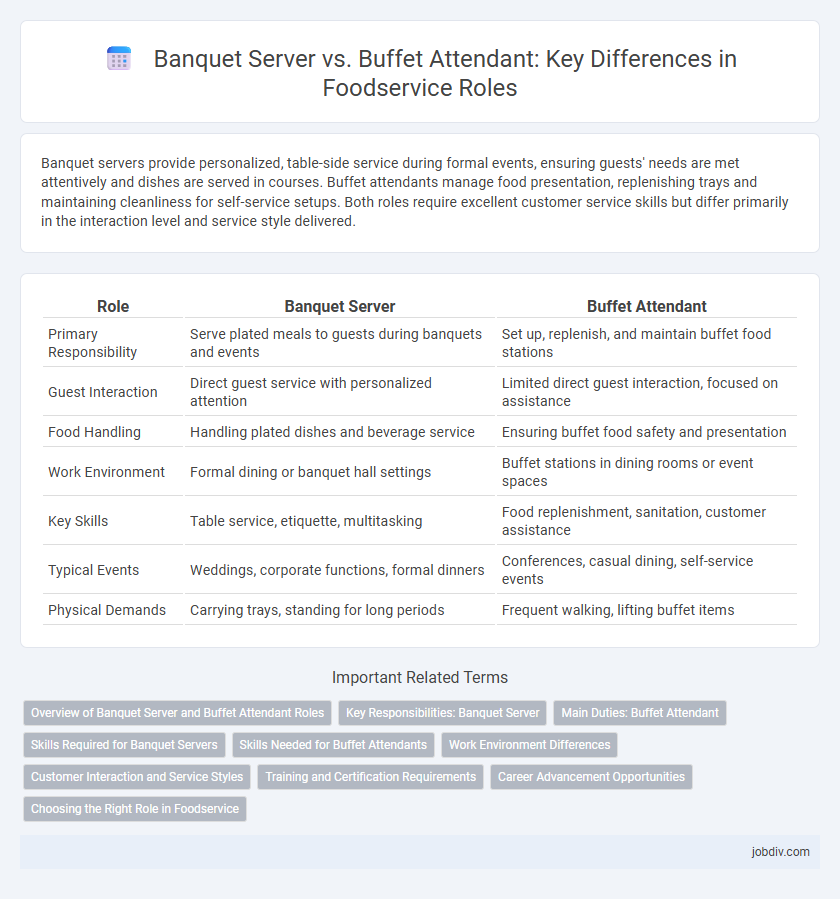Banquet servers provide personalized, table-side service during formal events, ensuring guests' needs are met attentively and dishes are served in courses. Buffet attendants manage food presentation, replenishing trays and maintaining cleanliness for self-service setups. Both roles require excellent customer service skills but differ primarily in the interaction level and service style delivered.
Table of Comparison
| Role | Banquet Server | Buffet Attendant |
|---|---|---|
| Primary Responsibility | Serve plated meals to guests during banquets and events | Set up, replenish, and maintain buffet food stations |
| Guest Interaction | Direct guest service with personalized attention | Limited direct guest interaction, focused on assistance |
| Food Handling | Handling plated dishes and beverage service | Ensuring buffet food safety and presentation |
| Work Environment | Formal dining or banquet hall settings | Buffet stations in dining rooms or event spaces |
| Key Skills | Table service, etiquette, multitasking | Food replenishment, sanitation, customer assistance |
| Typical Events | Weddings, corporate functions, formal dinners | Conferences, casual dining, self-service events |
| Physical Demands | Carrying trays, standing for long periods | Frequent walking, lifting buffet items |
Overview of Banquet Server and Buffet Attendant Roles
Banquet servers specialize in providing full-service dining experiences during events, efficiently handling plated meals, drink service, and guest interaction to ensure smooth banquet operations. Buffet attendants focus on setting up buffet lines, replenishing food stations, and maintaining cleanliness to facilitate a self-service dining environment. Both roles require strong customer service skills and attention to detail but differ significantly in their interaction style and service responsibilities.
Key Responsibilities: Banquet Server
Banquet servers are responsible for delivering exceptional table service during formal dining events, including setting tables, serving meals and beverages, and attending to guests' needs throughout the banquet. They ensure timely coordination with kitchen staff to present courses accurately and maintain a polished dining experience. Key tasks also involve clearing tables, replenishing supplies, and handling guest requests to uphold event quality and satisfaction.
Main Duties: Buffet Attendant
Buffet attendants primarily manage food presentation and replenishment, ensuring displays remain attractive and stocked throughout events. They assist guests by answering questions, serving items upon request, and maintaining cleanliness at the buffet station. Their role emphasizes efficient coordination to facilitate smooth guest flow and uphold food safety standards.
Skills Required for Banquet Servers
Banquet servers require exceptional interpersonal skills, attention to detail, and the ability to multitask efficiently in fast-paced environments. Strong knowledge of food safety standards and table service etiquette ensures seamless guest experiences during formal events. Proficiency in teamwork and effective communication is essential for coordinating with kitchen staff and managing large-scale banquets successfully.
Skills Needed for Buffet Attendants
Buffet attendants require strong organizational skills to efficiently manage food stations and replenish items promptly. Excellent customer service abilities are essential for assisting guests and maintaining a pleasant dining environment. Attention to hygiene standards and teamwork skills ensure smooth operations during high-volume events.
Work Environment Differences
Banquet servers typically work in formal event settings such as weddings, corporate dinners, or galas where they provide table service and ensure guest satisfaction throughout multi-course meals. Buffet attendants are usually stationed in self-service environments like hotel breakfast areas or casual dining events, focusing on replenishing food stations and assisting guests with food selection. The banquet server's work environment demands constant interaction and attentiveness to individual guests, while buffet attendants operate in more flexible, fast-paced atmospheres managing food presentation and cleanliness.
Customer Interaction and Service Styles
Banquet servers provide personalized, table-side service in formal dining settings, ensuring tailored guest experiences and seamless course delivery. Buffet attendants focus on managing food stations, assisting guests with selections, and maintaining cleanliness, emphasizing efficiency and self-service convenience. Both roles require strong interpersonal skills, but banquet servers prioritize direct customer engagement while buffet attendants facilitate a smooth, accessible service flow.
Training and Certification Requirements
Banquet servers typically require comprehensive training in formal table service, guest interaction, and etiquette, often supported by certifications such as ServSafe or hospitality management credentials. Buffet attendants need focused instruction on proper food handling, replenishment techniques, and safety protocols, with certifications emphasizing food safety standards. Both roles benefit from ongoing training to maintain compliance with health regulations and enhance customer service quality in foodservice environments.
Career Advancement Opportunities
Banquet servers often have greater career advancement opportunities through roles such as event manager or banquet supervisor, leveraging direct guest interaction and event coordination experience. Buffet attendants typically progress by specializing in food safety and service efficiency, potentially moving into kitchen support or catering logistics. Both positions provide foundational skills essential for management roles within the foodservice and hospitality industries.
Choosing the Right Role in Foodservice
Choosing the right role between banquet server and buffet attendant in foodservice depends on the event style and guest interaction level. Banquet servers provide table service, ensuring a formal dining experience, while buffet attendants manage food stations and assist guests with self-service. Understanding event needs and guest expectations helps optimize staffing efficiency and elevate customer satisfaction.
Banquet Server vs Buffet Attendant Infographic

 jobdiv.com
jobdiv.com